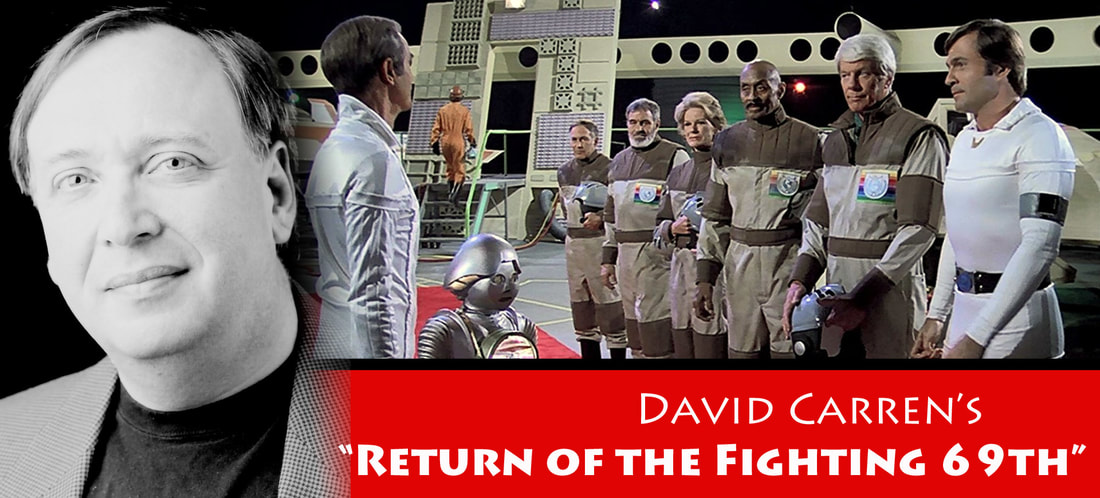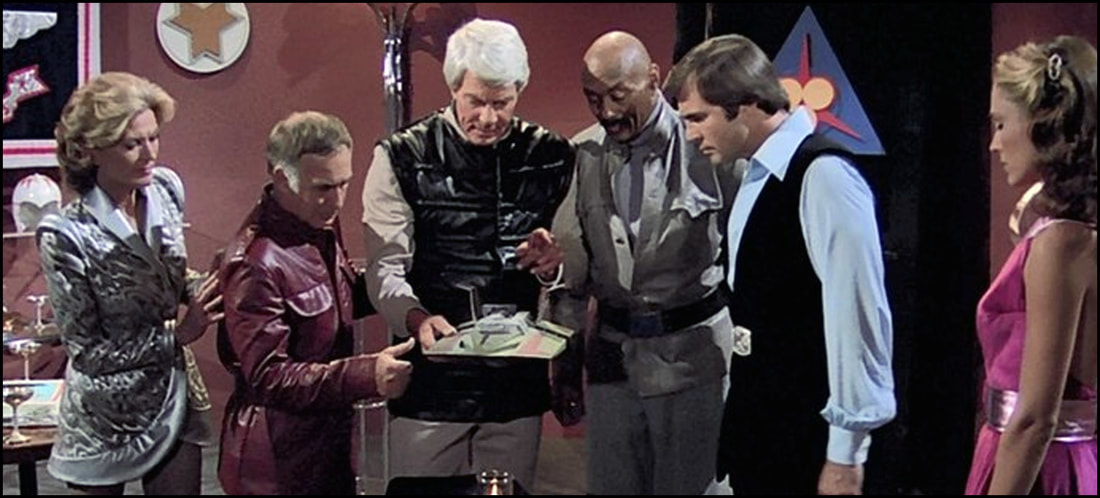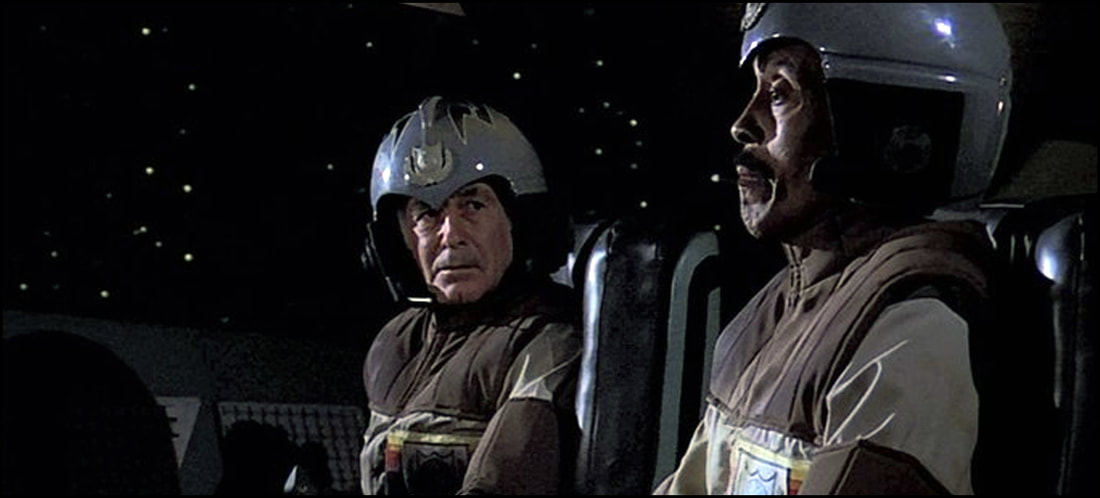Screenwriter David Carren Remembers His Time Aboard NBC's Buck Rogers ... And Beyond
In that respect, he admits there were many lessons he had to learn by way of unintentional mistakes. “I was totally inexperienced: you don’t want to put rain, water, or animals in a scene. You don’t want to spray glass (i.e. window breaking) because that’s a one-take operation, and it’s very expensive to produce.”
Carren even confesses his script for “Return Of The Fighting 69th” – a first season adventure for NBC’s Buck Rogers In The 25th Century, his first full-fledged screen effort – taught him a valuable warning involving warfare.
“I had this idea of using a machine gun that no one of Buck’s era knew what it was, and squibs were an elaborate and expensive gag,” he laughs. “Well, the machine gun kept jamming! The M1’s were perfect, but anything else jammed. If you look carefully at the show, right as Buck’s about to back out of the door and he’s shooting it up at the air, it stops shooting and Gerard has this brief look of frustration on his face as the door closes. That damn thing jammed every take! I can’t believe we won the war with those things!”
Still, what Carren did have was an inexhaustible love of film as well as a desire to tell his own stories, even if that meant borrowing the voices of characters already created to get his start. So he took a bus ride in 1974 from Texas to California, and the rest – as they say – is history. The man’s IMDB.com profile today boasts a resume of over two hundred different credits in writing and/or production; and he’s made contributions to such television properties as Gene Roddenberry’s Star Trek: The Next Generation, Gerry Anderson’s Space Precinct, William Shatner’s TekWar, and Syfy’s long-running Stargate:SG-1.
“The thing about writing for television is that the show has its own world and its own characters,” Carren explains, “and those characters have their own voices. With any TV show you work for, you have to have your character’s voice patterned or similar or recognizable as the voices of the characters that have been established. Most writers understandably get into writing to do their own stuff. It’s actually a relatively small number of writers who can develop a career of any length or position in TV because they have to be chameleons mimicking the voices of their work with voices that have been established … and that’s often very difficult for a lot of people to do.”
However, getting a start in the 1970’s did offer Carren a unique advantage over those attempting to break-in to today’s competitive marketplace, that being even inexperienced yet talented writers could get an agent who could open doors to the ‘story pitching’ process.
“And there’s almost no point in pitching unless someone in the room has the power to buy. For Buck Rogers, I pitched the ‘The Over-The-Hill Gang’ meets ‘Star Wars’ to Bruce Lansbury, the show’s producer.”
Perhaps because “Return Of The Fighting 69th” was his first filmed script, Carren vividly remembers his time on the set. “It was an 8-day shoot, which was very generous as most episodes were shot in 6 days. I hung out on the set every day. I was in the dailies. I hung out with the actors, which was a dream come true for any film buff.”
Indeed, Carren’s ‘Fighting 69th’ were a team of aging combat pilots forced into retirement precisely because they were considered too old to defend Earth, a sentiment the screenwriter has seen mirrored in his own life. “In Hollywood, you hit your fifties and you’re done,” he cautions in remembering the project. For that reason, many aging actors and actresses tend to transition from screen work to smaller television projects precisely because they are available and in need of work, a reality that presented Carren with what he considered the opportunity of a lifetime: to spend time on-the-set with some screen legends.
“We cast Peter Graves (Mission Impossible),” he says, “who was in between projects and available at the time. We worked with Eddie Firestone (The Great Locomotive Chase; The Law And Jake Wade) and K.T. Stevens (Port Of New York; Alfred Hitchcock Presents) who was making films in the 1940’s. We cast Robert Quarry (Perry Mason; Dr. Phibes Rises Again). And we got Woody Strode (Sergeant Rutledge; The Man Who Shot Liberty Valance)! He was making films with John Ford. See, older actors don’t work as much, and there are a lot of really good older actors. As we developed the story, we got more and more interested in these other characters.”
As to the task of writing Science Fiction – a genre which unlike many others in network television requires a significant level of world creation – Carren takes it all with a smile. “I love the challenge, but you’re always tearing your hair out. I was well read in Science Fiction. I knew the material. I knew the source material. You have to be ‘lettered’ in any genre like this. Your ideas can come from all sorts of strange places and end up in all sorts of strange places.”
His experiences in crafting stories for Buck Rogers and Star Trek: TNG programs as well as scripts for Beyond Westworld, The Powers of Matthew Star, and the 1980’s version of The Twilight Zone has led him to creating a few rules to avoid the pitfalls of SciFi screenwriting.
“Second, you still want to create some colorful and science fictional aspect that brings out some side of that world, so the challenge is that you have to come up with an idea that fits that world, opens up some new parameter, makes things exciting, and yet you can still shoot it.”
For this reason, he cites his episode of Star Trek: The Next Generation – the popular fourth season outing “Future Imperfect” – as being one of his personal favorite creations.
“Everything used was a redress of standing sets because it was set on an alternate Enterprise,” he explains, showing how he used his rules to his professional advantage.
These days, Carren still has various projects under consideration, but more often than not he’s exploring his love of teaching the craft of screenwriting: he presently serves as an Associate Professor and Interim Chair for the University of Texas Rio Grande Valley’s Theatre, TV and Film Department, a unified program where the different artforms work together. He speaks highly of the curriculum in an environment where the various artists aren’t at odds with one another but instead collaborate, a union that vastly expands the resources available to the students. He’s even taken a page out of the history of his own professional experience and adapted it for class, taking the attendees through his process of creating a graphic novel and then adapting it for television, giving them an up-close-and-personal look at how entertainment works on varying levels.
“If there’s any advice I can give to a writer it is that you find your own voice and then be willing to speak in other people’s voices so that you can have a career,” he advises. “Take whatever you can learn, then forget it. Forget it when you get into that professional situation because it’ll be completely different. And then – when it comes in handy – remember it.”




 RSS Feed
RSS Feed